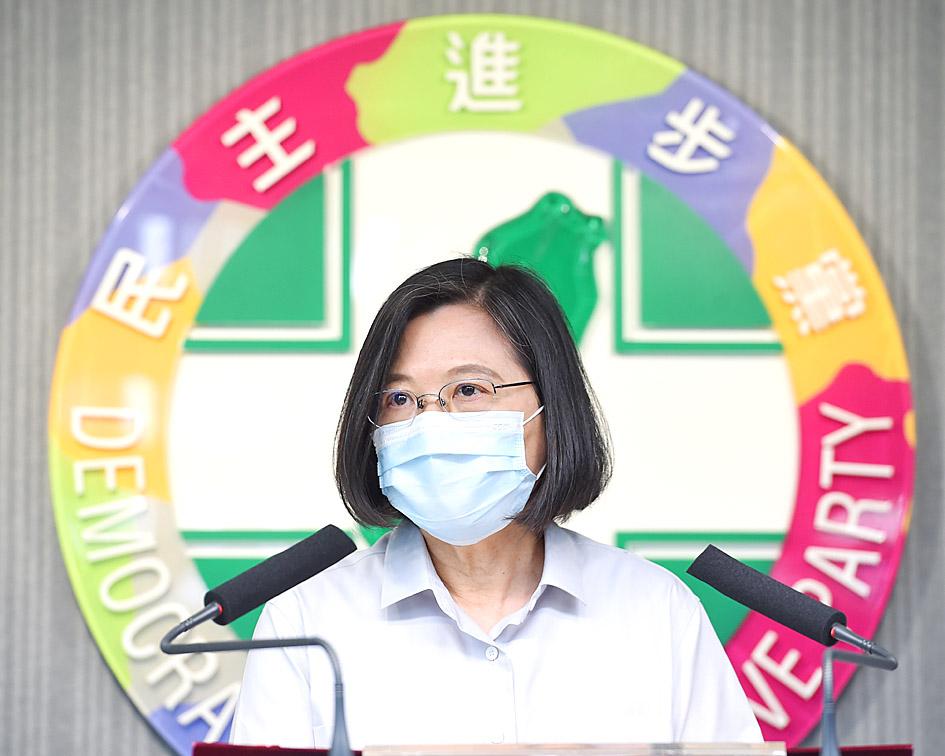President Tsai Ing-wen (蔡英文) on Wednesday offered a public apology, following media reports of a Democratic Progressive Party (DPP) member being affiliated with an organized crime group, and said that the party would tighten its review mechanism to screen out unqualified people.
“In recent days, reports on gang activities and crime have been linked to the DPP’s internal management of party membership. These have led to criticism and have tarnished our party’s image,” said Tsai, who is also the DPP chairperson, at the party’s headquarters in Taipei.
“The DPP failed to fully implement the party’s clause on prohibiting gang-affiliated people from becoming a party member, which has led to controversies and disappointed our supporters. I apologize for this,” she added.

Photo: Liu Hsin-de, Taipei Times
Tsai was referring to the case involving Chao Ying-kuang (趙映光), convener of the DPP Taipei chapter’s review committee, who resigned last week, following reports about his son Chao Chieh-yu (趙介佑), who is under investigation for racketeering, assault and kidnapping related to an organized crime group based in Taipei’s Beitou District (北投).
The DPP in 2013 added a clause to its charter that says it will not allow people to apply for party membership if they are convicted of breaching the Organized Crime Prevention Act (組織犯罪防制條例), the Narcotics Hazard Prevention Act (毒品危害防制條例), or the Controlling Guns, Ammunition and Knives Act (槍砲彈藥刀械管制條例).
“In the coming days, the DPP will institute a new system for background checks, and check court ruling records and other open information platforms. Regular checks will be conducted on new members, and party candidates running in elections, and will assess their performance when they are elected to public office. These will also remove those found to be affiliated with organized crime groups,” Tsai said.
The party will make use of an artificial intelligence (AI) information system to prevent members of organized crime groups from joining the party, DPP secretary-general Lin Hsi-yao (林錫耀) said.
Taiwan People’s Party Legislator Ann Kao (高虹安), known for her specialty in digital technology, yesterday praised the DPP for its efforts, but added that technology alone would not help the party deal with the problem of infiltration by organized crime.
“AI is mainly utilized to analyze large amounts of data and to extract useful information. Making a model requires a supply of materials and markers from which patterns and definitions could be derived,” she wrote on Facebook.
“Introducing AI might help with the technical issues involved in the evaluation [of party members], but a political party must depend on the innate wisdom of humans for its core values and standards of conduct,” she said.
“Politics is the work of human beings governing other human beings,” Kao said.
“The DPP has had the rule to exclude gang members for a very long time; the rule failed because its users did not put their minds to implement it,” she said.

Eight restaurants in Taiwan yesterday secured a one-star rating from the Michelin Guide Taiwan for the first time, while three one-star restaurants from last year’s edition were promoted to two stars. Forty-three restaurants were awarded one star this year, including 34 in Taipei, five in Taichung and four in Kaohsiung. Hosu (好嶼), Chuan Ya (川雅), Sushi Kajin (鮨嘉仁), aMaze (心宴), La Vie by Thomas Buhner, Yuan Yi (元一) and Frassi in Taipei and Front House (方蒔) in Kaohsiung received a one-star rating for the first time. Hosu is known for innovative Taiwanese dishes, while Chuan Ya serves Sichuan cuisine and aMaze specializes

STATS: Taiwan’s average life expectancy of 80.77 years was lower than that of Japan, Singapore and South Korea, but higher than in China, Malaysia and Indonesia Taiwan’s average life expectancy last year increased to 80.77 years, but was still not back to its pre-COVID-19 pandemic peak of 81.32 years in 2020, the Ministry of the Interior said yesterday. The average life expectancy last year increased the 0.54 years from 2023, the ministry said in a statement. For men and women, the average life expectancy last year was 77.42 years and 84.30 years respectively, up 0.48 years and 0.56 years from the previous year. Taiwan’s average life expectancy peaked at 81.32 years in 2020, as the nation was relatively unaffected by the pandemic that year. The metric

Taitung County is to launch charter flights to Malaysia at the end of this year, after setting up flights to Vietnam and Thailand, the Taitung County Government said yesterday. The new charter flight services, provided by low-cost carrier Batik Air Malaysia, would be part of five-day tour packages for visits to Taitung County or Malaysia. The Batik Air charter flight, with about 200 seats, would take Malaysian tourists to Taitung on Dec. 30 and then at 12:35pm return to Kuala Lumpur with Taiwanese tourists. Another charter flight would bring the Taiwanese home on Jan. 3 next year, arriving at 5:30pm, before taking the

Taiwan High Speed Rail Corp. (THSRC) plans to ease strained capacity during peak hours by introducing new fare rules restricting passengers traveling without reserved seats in 2026, company Chairman Shih Che (史哲) said Wednesday. THSRC needs to tackle its capacity issue because there have been several occasions where passengers holding tickets with reserved seats did not make it onto their train in stations packed with individuals traveling without a reserved seat, Shih told reporters in a joint interview in Taipei. Non-reserved seats allow travelers maximum flexibility, but it has led to issues relating to quality of service and safety concerns, especially during